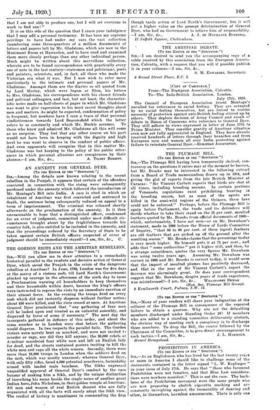THE PLUMAGE BILL. [To THE EDITOR OF THE "SPECTATOR."] SIR,—The
Plumage Bill having been temnorarily shelved, con- troversy on the questions it raises may at the moment be barren, but Mr. Brooks may be interested in the following extract from a Board of Trade memorandum drawn up in 1914, and giving the gist of reports from the late British Minister at Caracas: "Sir Vincent Corbett reports that birds are shot at all times, including breeding seasons. In certain portions of Venezuela regulations exist prohibiting hunting in the breeding season, but as most of the egrets are killed in the semi-wild regions of the Orinoco, these laws could not be enforced." Perhaps, before the Plumage Bill is again before Parliament, the trade and its defenders will decide whether to take their stand on the 25 per cent. moulted feathers quoted by Mr. Brooks from official documents of 1909— which, unfortunately, I have not seen—or on Mr. Downham's statement, made in 1908 before the House of Lords Committee of Inquiry, "that 80 to 90 per cent, of these (egret) feathers are old feathers that are picked up off the ground after the moulting season." Mr. Brooks claims that the percentage to-day is very much higher. He himself puts it at 75 per cent., and adds that "some authorities" put it higher still, and then, by a strange coincidence, quotes the very figures Mr. Downham was using twelve years ago. Assuming Mr. Downham was correct in 1908 and Mr. Brooks is correct to-day, it would seem that the import of moulted plumes has positively decreased. and that in the year of Sir Vincent Corbett's report the decrease was alarmingly great. Or does your correspondent suggest that Mr. Downham, despite years of trade experience, was misinformed?—I am, Sir, &c., WILLOUGHBY DEWAR
(Hon. Sec. Plumage Bill Group). 8 Kenilworth Court, Putney, S.W. 15.


































 Previous page
Previous page